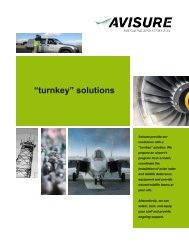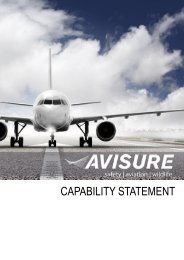Avisure Capability Statement.V2(Arpil2020)
You also want an ePaper? Increase the reach of your titles
YUMPU automatically turns print PDFs into web optimized ePapers that Google loves.
WILL JAMIESON
RONEL JIT
Will has been involved in assessing, developing and
implementing wildlife strike management programs at
airports across the globe for twelve years and is currently
responsible for project managing the wildlife
management programs for Vancouver International,
Sydney International, and Launceston Airports.
He has thousands of hours’ hands-on airside experience,
ranging from establishing and implementing airside
surveys to undertaking active hazard management using
a range of tools including lasers, stock whips, and
firearms (pyrotechnics and live shot).
Will leads and mentors teams in Australia and Canada
and provides quality assurance for project design and
implementation. In this way, his airside operations and
ecological knowledge is infused in Avisure projects
around the world. He takes a pragmatic approach to
addressing human-wildlife conflict issues ensuring that
various stakeholder perspectives are included in holistic
solutions.
Ronel is a senior environmental scientist in the field of
wildlife strike assessment and mitigation, airport safety
and fauna management and has been a key member of
our team since 2009. He has been instrumental in implementing
the Australian Defence National Wildlife Hazard
Management Strategy. Ronel’s understanding of wildlife
hazard management at military bases is based on thousands
of hours of on-the-ground work actively managing
and monitoring wildlife hazards. Ronel has developed
and implemented the separation-based management
approach which treats wildlife-aircraft separation in the
same manner as aircraft-aircraft separation. His ability to
successfully implement this approach requires an intimate
understanding of airside operations and behavioural
characteristics of wildlife. Ronel’s approach has reduced
the total number of strikes as well as the number
of damaging strikes at each of the bases where his
teams operate. The programs’ successes are based on
Ronel’s inclusion of multiple stakeholders including flying
squadrons, air traffic control, senior officers, environmental
officers, external contractors, and government
agencies.
Ronel recognises there are still improvements that can
further reduce wildlife strikes at military bases. He is
researching and implementing the latest industry technology,
including avian radar, to minimise risk to personnel
and the cost and loss of capability associated with
wildlife strike to Australian Defence Force aircraft.
11







